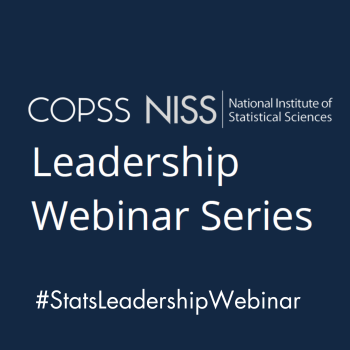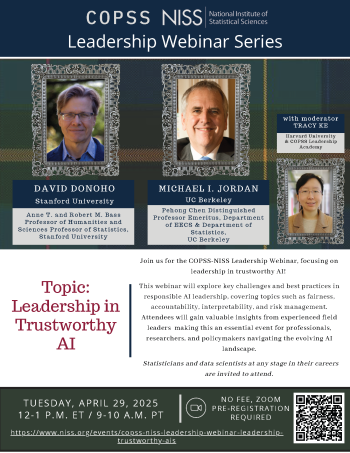

Date: Tuesday, April 29, 2025 at 12-1pm ET
The webinar was convened to engage thought leaders in the field of machine learning and statistics to discuss the goal of developing trustworthy AI systems that work reliably and transparently, while aligned with human values. The panelists discussed the importance of trustworthiness, fairness, and interpretability, some looming obstacles or roadblocks standing in the way, some new pathways to achieving such goals, and the potential opportunities and challenges of AI in diverse fields. Along the way, our speakers addressed the cultural splits that are seen between AI developers and academics, the relationship between data science and AI, the importance of statistics in machine learning, the need for economic thinking to be conjoined with statistical and computational thinking in the design of real-world AI systems, and the need for a cultural shift in the mathematical sciences community to embrace empirical research about methodology.
Joining this important conversation were two of the most influential voices in the field. Dr. David Donoho (the Anne T. and Robert M. Bass Professor of Humanities and Sciences and Professor of Statistics at Stanford University), brought deep insight into the evolving interface between empirical machine learning and statistical methodology. Dr. Michael I. Jordan (the Pehong Chen Distinguished Professor Emeritus at the University of California, Berkeley), renowned for his pioneering work across statistics, computer science, and AI, shared a compelling vision of AI as an engineering discipline informed by economics and uncertainty. The distinguished panelists are also both members of the National Academy of Sciences. The discussion was skillfully moderated by Dr. Tracy Ke (Associate Professor of Statistics at Harvard University), who guided the conversation through complex and timely issues surrounding trustworthy AI.
Trustworthy AI: Panelists' Perspectives and Discussion
The webinar was divided into three parts: panelists sharing their perspectives, a panel discussion, and an open floor for audience interaction during a live Q&A session. Dr. David Donoho presented first and discussed the primary role played in today’s AI development by leaderboard competitions, and claimed that the leaderboard culture currently shows little concern for the trustworthiness and alignment issues – perhaps inherently so. Mathematically trained scientists, like statisticians, are raised in a very different culture, based on very careful analysis and design of methods, while empirical machine learning is focused on “number go up”. He also shared his pivotal moment of understanding how, to empirical scientists, mathematical truths are just optional gadgets that can be respected just in case they help “number go up”.
AI Leaderboards and Singularity Concerns
David discussed the current trend of leaderboards in the field of artificial intelligence, particularly in the context of machine learning. He highlighted how these leaderboards capture everyone's attention, with examples like the competition between leading LLMs across various tasks. David also pointed out that many such competitions have been held across decades, in vision, language processing and other areas, with the general experience that as these competitions progress, task performance eventually exceeds human levels. Society at large, and media specifically, are impressed with this arrival of so-called super-human performance, and titans of technology are now forecasting the imminent arrival of “the Singularity”, while massive sums of investor capital are being channeled towards the top leaderboard competitors. He concluded by emphasizing the difficulty of addressing concerns like trustworthiness, fairness, and interpretability in an environment where trillions of dollars are at stake. He noted that the leaderboard-driven nature of current developments is less apparent to mathematical scientists, who were trained in classical research paradigms.
AI Trustworthiness and Engineering Disciplines
Michael shifted the narrative, arguing that AI should be viewed as an engineering discipline rather than a science, and that economic concepts and social context should be considered in discussions of trustworthiness. He also highlighted the history of AI, from its origins in machine learning to the emergence of large language models, emphasizing that such models are not a single intelligent entity but rather an amalgam arising from the creations and interactions of billions of humans.
Collectives and Microeconomics in Intelligent Systems
Michael discussed the importance of collectives in mitigating uncertainty and building intelligent systems. He emphasized the need for a microeconomic perspective in statistics and machine learning, bringing concepts such as information asymmetries, incentives, and equilibria into the conceptual toolbox. He also highlighted the fact that collectives involve local data, local knowledge, and strategic usage of these resources, in addition to the resources provided by global models.
AI Trustworthiness and Incentives Discussion
Michael and David discussed the potential opportunities and challenges of AI in diverse fields such as scientific research, healthcare, and social welfare. Michael emphasized the importance of trustworthiness in AI and highlighted the need for economics to enter the picture alongside mathematical statistics and machine learning. Properly applied, economic incentives can ensure trustworthiness, by aligning incentives to ensure the quality of the data being used and ensuring transparency and auditing mechanisms. They also discussed the importance of combining local data with AI-generated data to improve trustworthiness.
AI's Impact on Scientific Publishing
David discussed how AI has changed the rules in scientific publishing, citing the example of DeepMind's AlphaFold publishing speculative protein structures in Nature prior to full validation. He also mentioned the recent changes in the political climate affecting attitudes towards side-effects of AI, citing the changing status of work on disinformation by researchers at US universities. Michael emphasized the long-term importance of universities in developing and teaching ideas related to AI, citing Berkeley's development of platforms such as Spark and Ray that lie behind ChatGPT and many other applications of large-scale machine learning.
Economists' Role in Trustworthy AI
Michael discussed the potential for economists to contribute to the development of trustworthy AI systems. He argued that economists could provide valuable insights on how to regulate AI effectively, focusing on equilibria of systems rather than simply focusing on individual behaviors or algorithms. Michael also discussed the concept of data markets, where data is valued as an economic good. David asked Michael to elaborate on how this marketplace could be designed, to which Michael responded by explaining a three-layer data market system where platforms add noise to data to protect privacy, which affects the entry of users into the market and the entry of data buyers into the market He gave an example of regulation whereby the government imposes a minimum level of privacy rather than dictating an absolute level, noting that this leads to higher social welfare.
AI's Impact on Statistical Research
David emphasized the importance of benchmarks and leaderboards in AI, and how they have driven advancements in empirical subjects – but also changed the nature of research from delivering new insights to delivering “numbers that go up.” He related this to the emergence of computer science conferences as a new scientific publishing paradigm, saying that these conferences now dare at or near the top of the “league tables” of scientific journals according to citation metrics. He suggested that statisticians need to adapt to this new paradigm to stay relevant. The discussion concluded with Tracy posing two questions: the role of AI in statistical research and the future of theoretical research in the context of the AI-driven trend.
Statistics in Machine Learning
Michael discussed the importance of a statistical perspective in real-world deployments of machine learning, highlighting the particular contribution of causal inference. David highlighted the need for a cultural shift in the mathematical sciences community to embrace empirical research about methodology. He pointed out that the longstanding mindset that empirical findings about mathematical questions have no status and can’t get publication credit is a barrier to progress. Michael also mentioned the potential of AI and machine learning in mathematics, predicting that mathematicians will increasingly rely on empirical methods in their work.
AI's Impact on Research and Statistics
During the panel, Tracy, Michael, and David discussed various topics related to AI and its impact on research and statistics. They addressed the issue of data quality and the importance of transparency in AI methods. Michael emphasized the need for open-source systems and the need to build systems that deliver economic value to creators. David raised concerns about the overwhelming nature of AI's rewriting the rules of research, citing an example of the research vogue into “ AI surveys” that don't involve asking humans their opinions, only LLMs. The panel agreed that AI is a rapidly evolving field and that it's crucial to understand its implications and potential consequences.
Acknowledgments and Recognition:
We extend our sincere thanks to the distinguished panelists, Dr. David Donoho and Dr. Michael I. Jordan, for their thought-provoking insights and engaging dialogue on the future of trustworthy AI. Special appreciation goes to Dr. Tracy Ke for skillfully moderating the session and fostering a rich, thoughtful discussion. This event was made possible through the collaboration between the Committee of Presidents of Statistical Societies (COPSS) and the National Institute of Statistical Sciences (NISS). For more information about the COPSS-NISS Leadership Webinar Series visit the COPSS-NISS Leadership Series Page.
The purpose of the webinar series is to promote leadership skills for members of the statistical societies at any stage in their careers. The series features conversations with leaders throughout the discipline, including leaders from major academic and government institutions, and companies. Invited speakers share their leadership stories and answer questions about their experiences. Each webinar is moderated by a member of the COPSS Emerging Leaders in Statistics program.
Access the Full COPSS-NISS Leadership Webinar Series YouTube Playlist | COPSS-NISS Leadership Webinar Series: https://www.youtube.com/playlist?list=PLoRtupvDJTjvFukMcO6NfDr0GvxDsIj81
